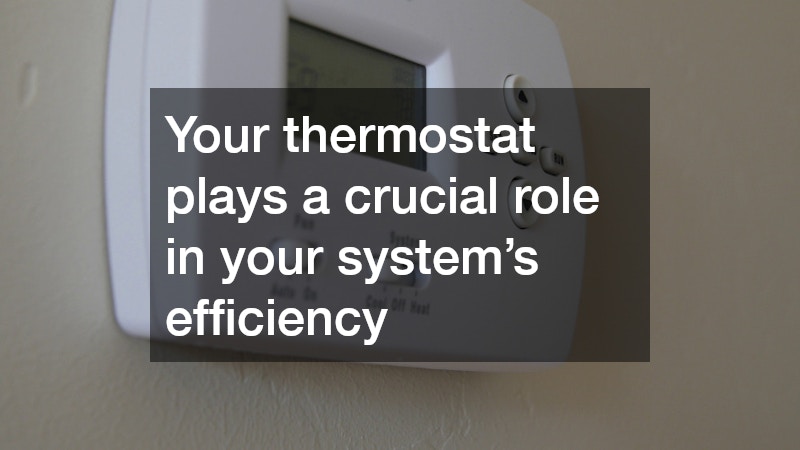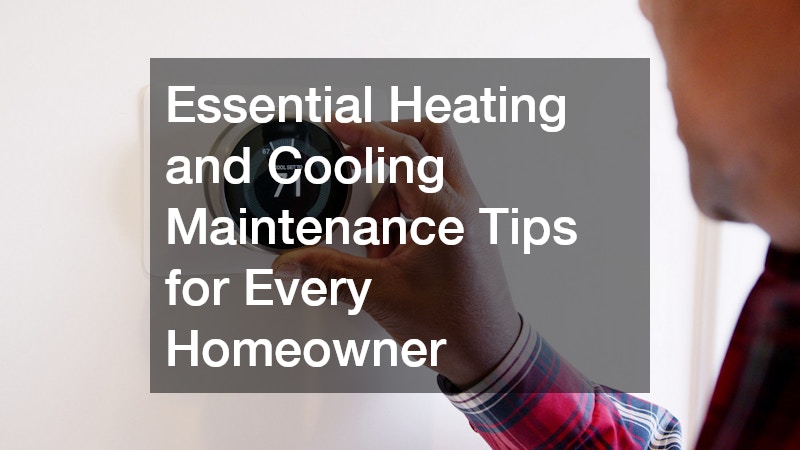Maintaining a comfortable home environment requires more than just installing a heating and cooling system—it requires consistent care and attention. Your HVAC system works hard throughout the year, adapting to seasonal changes, extreme temperatures, and daily usage. Without proper maintenance, these systems can become less efficient, more expensive to operate, and prone to costly breakdowns.
Whether you’re a new homeowner or simply looking to extend the lifespan of your HVAC system, following essential heating and cooling maintenance tips can make all the difference.
Regularly Replace or Clean Air Filters
Air filters are the unsung heroes of any HVAC system. They trap dust, allergens, and debris, ensuring that the air circulating in your home remains clean and healthy. Over time, however, filters become clogged, which forces your system to work harder and reduces efficiency. A dirty filter can also strain the blower motor and negatively impact indoor air quality. Checking filters monthly, especially during periods of heavy use, and replacing disposable filters every one to three months can significantly improve the performance of your system. For reusable filters, washing them as recommended by the manufacturer is essential. Keeping your air filters clean allows your HVAC system to operate smoothly, reduces energy costs, and keeps your home environment comfortable and healthy.
Schedule Annual Professional Inspections
Even the most diligent homeowners cannot detect every potential problem with their heating and cooling systems. Professional HVAC technicians have the training and tools to identify small issues before they escalate into major repairs. Annual inspections are particularly important before peak heating or cooling seasons. During an inspection, technicians typically check refrigerant levels, examine ductwork for leaks or blockages, test the thermostat, and clean key components such as coils and blower fans. Investing in professional inspections helps prevent unexpected breakdowns, extends the life of your system, and ensures it remains energy efficient.
Keep Vents and Registers Clear
Blocked or obstructed vents and registers can restrict airflow, forcing your HVAC system to work harder to maintain a consistent temperature. Items like furniture, rugs, or curtains can unintentionally block airflow, which may result in uneven heating or cooling and higher energy bills. Maintaining clear airflow throughout your home ensures that every room receives the right amount of conditioned air. Regularly dusting or vacuuming vents, keeping furniture a few inches away from registers, and ensuring that registers are fully open during operation are simple yet effective ways to maintain proper airflow and maximize system efficiency.
Maintain Your Thermostat
Your thermostat plays a crucial role in your system’s efficiency and overall energy usage. An outdated or improperly calibrated thermostat can lead to unnecessary energy consumption. Upgrading to a programmable or smart thermostat allows homeowners to automate temperature adjustments based on their schedule, preventing wasted energy. Periodically checking the thermostat’s calibration and replacing batteries in battery-operated units at least once a year ensures accurate temperature readings. A well-maintained thermostat enables homeowners to regulate indoor temperature efficiently while reducing both energy costs and environmental impact.
Inspect and Clean Ductwork
Ductwork serves as the primary pathway for heated or cooled air throughout your home. Leaks, cracks, or excessive dust buildup in ducts can significantly reduce system efficiency and negatively impact indoor air quality. According to the U.S. Department of Energy, leaky ducts can reduce heating and cooling efficiency by as much as 20 percent. Homeowners should periodically inspect visible ductwork for signs of leaks or damage. Small leaks can be sealed using foil-backed duct tape or mastic sealant, and professional duct cleaning every three to five years can help remove accumulated dust and debris. Well-maintained ductwork ensures your HVAC system delivers consistent comfort throughout your home.
Check and Clean Outdoor Units
The outdoor components of an air conditioner or heat pump, such as the condenser and fan, are exposed to weather, debris, and vegetation. Over time, leaves, dirt, and grime can accumulate on these units, reducing efficiency and potentially causing damage. Homeowners should keep the area surrounding the unit clear of plants and debris, clean fins and coils carefully with a garden hose, and ensure the unit is level to prevent strain on the compressor. Proper care of outdoor units improves overall system performance and helps avoid expensive repairs.
Maintain Proper Refrigerant Levels
Refrigerant is critical for cooling your home efficiently. Low refrigerant levels can cause your air conditioner or heat pump to work harder, which may result in poor performance and higher energy bills. It can also damage the compressor, one of the most expensive components of an HVAC system. Signs of refrigerant issues include warm air blowing from the vents, hissing or bubbling noises near the unit, or ice buildup on refrigerant lines or coils. Handling refrigerant requires professional expertise, so always consult a certified HVAC technician for proper maintenance.
Monitor Energy Usage
Keeping an eye on energy bills can provide early warning signs of HVAC inefficiency. Sudden spikes in electricity or gas usage may indicate that your system is struggling due to worn components, clogged filters, or duct leaks. Comparing monthly energy bills, installing an energy monitor for real-time tracking, and investigating unusual spikes with a professional technician are effective strategies. Monitoring energy usage not only helps detect potential issues early but also encourages energy-saving practices that can reduce costs over time.
Seasonal Maintenance Routine
Establishing a seasonal maintenance routine ensures your HVAC system operates at peak performance year-round. In the spring and summer, homeowners should focus on cleaning and inspecting the outdoor AC unit, replacing or cleaning air filters, and testing the thermostat and cooling function. During the fall and winter, scheduling a heating system inspection, replacing air filters, cleaning vents, and checking for drafts and proper insulation can make a significant difference in system performance and comfort. Consistently following a seasonal routine helps prevent issues and ensures reliable operation in every season.
A well-maintained heating and cooling system is essential for comfort, energy efficiency, and long-term savings. Regular air filter changes, professional inspections, clear vents, careful monitoring of ductwork and thermostats, and attention to refrigerant levels all contribute to a smoothly running HVAC system. By following these maintenance tips, homeowners can avoid costly repairs, improve indoor air quality, and enjoy consistent comfort throughout the year. Taking proactive steps to care for your heating and cooling system protects your investment and creates a healthier, more energy-efficient home environment, ensuring your family stays comfortable no matter the season.






